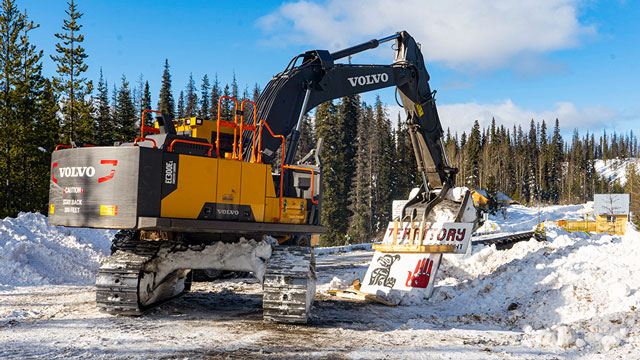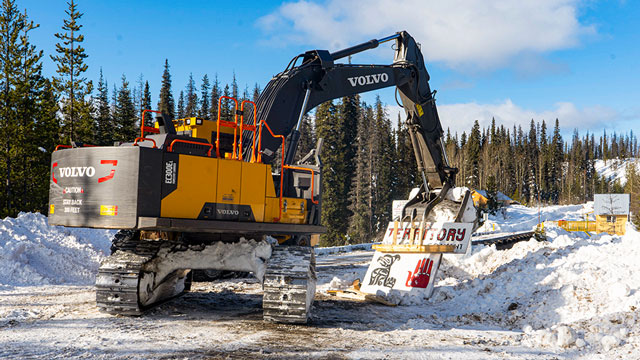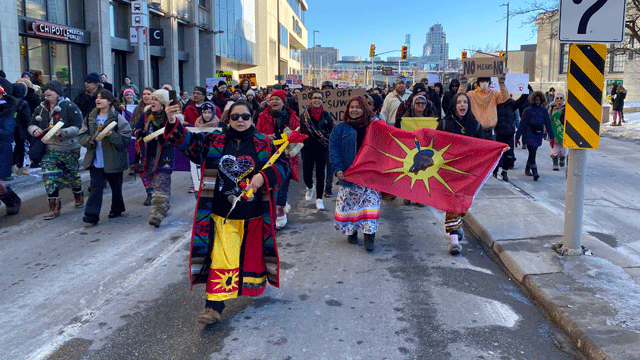
(Heavy machinery clears a checkpoint after RCMP finished enforcing an injunction along the Morice West Forest Service Road. Photo: Lee Wilson/APTN)

Minister of Crown-Indigenous Relations Carolyn Bennett told MPs on Tuesday her government will not tell the RCMP to leave Wet’suwet’en territory.
“It is very important to remember that the government does not have the authority to dictate the processes to the RCMP,” said Bennett during an emergency debate in the House of Commons on Tuesday night.
“It is not the role of parliamentarians to tell the police how to do their job.”
RCMP presence in northern British Columbia is preventing proposed discussions between hereditary chiefs of the Wet’suwet’en Nation and representatives of federal and provincial governments.
Hereditary chiefs spoke with Bennett by phone Tuesday afternoon.
Bennett said she is committed to meeting as soon as the chiefs issue her an invitation to the territory.
“There was a possibility of a meeting at the end of the month. We are now saying we would like to meet as soon as possible and we are waiting for their invitation to have that meeting,” she said.
But Hereditary Chief Woos, also known as Frank Alec, said the chiefs agreed that discussions won’t take place until Mounties “pick up everything and go and do not return.”
The people demonstrating near train tracks just off Tyendinaga said the same thing after meeting with Minister of Indigenous Services Marc Miller on Saturday, where Chief Woos called in.
They won’t halt their action until the RCMP withdraw.

Indigenous youth who spoke at a solidarity march in Ottawa on Monday echoed the demand outside of Prime Minister Justin Trudeau’s office. The march wound through the city for three hours. People stopped on the Rideau Canal and blocked traffic, drumming, singing, dancing, and chanting anti-RCMP slogans.
Sgt. Janelle Shoihet confirmed an RCMP detachment called the Community-Industry Safety Office (C-ISO) continues to patrol the lands. It’s been there since the RCMP enforced an interim injunction in January 2019.
Shoihet said she’s aware of the request to have the C-ISO withdraw and that “discussions are underway.” She would not confirm the number of officers deployed.
This puts the federal government in a bind. Neither side has budged and a compromise is necessary to move forward with proposed talks.
Trudeau took this position Feb. 14 at a news conference in Germany.
Canada “is not the kind of country where politicians get to tell the police what to do in operational matters,” Trudeau said in response to Andrew Scheer.
Scheer demanded Trudeau pick up the phone and direct RCMP to move in and dismantle what the outgoing Tory leader considers “illegal blockades.”
Bennett’s statement affirmed that if the feds will not tell police to move in, neither will they direct RCMP to withdraw.
Mounties concluded enforcing an injunction on unceded Wet’suwet’en territory on Feb. 10.
Federal police spent the previous four days dismantling checkpoints and camps along with Morice West Forest Service Road near Houston, B.C. Twenty-eight were arrested in the operations.
APTN has amalgamated it’s previous Wet’suwet’en coverage. It can be found here.
On Friday, Coastal GasLink (CGL) issued its construction update. The company said “clearing and grading” is slated to begin on the disputed territory.
– with files from the Canadian Press










Disappointing. I had hopes Minister Bennett would see the clarity of the situation and make a good recommend, but she simply echoed Trudeau.
The chiefs have been clear from the start and have not wavered.
CGL and RCMP out of their home.
Do that and talks can begin.
What does this mean that RCMP do not take direction from government? Have they gone rogue?
What troubles me is that not one single tribe who are actually the beneficiaries of the joint partnerships along the pipeline are represented in these blockade actions. How many in this leadership are paid and/or foreign activists? Remember Kitimat.
APTN SHE DID NOT SAY THAT. SHE SAID SHE CAN’T BECAUSE OF JURISDICTION
well why do they have to go through First Nation territory, I doubt that they want to go through towns so why through where FN people live?